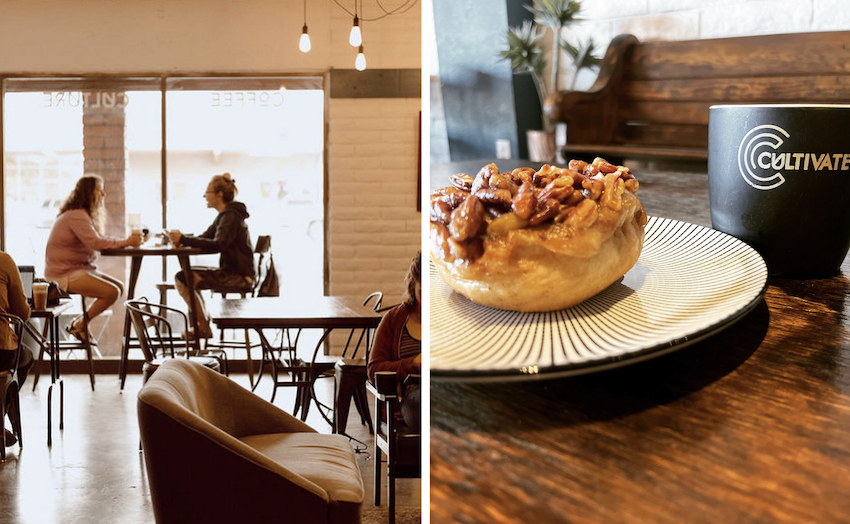More than a coffee shop

There were two main points of focus when the couple was brainstorming the foundation for the shop. Cultivate needed to be a place that generated income, but also worked simultaneously as a chance to employ underprivileged youth.
The Priebes work to provide leadership opportunities and life skills for these individuals in addition to jobs behind the bar making coffee. They are challenged to use the space to improve the community, build tangible skills and prepare their newly learned transferable job skills for the current market. The shop and its owners take two yearly cohorts usually made up of between five to 10 teens and young adults.
The first Cultivate cohort focuses on employability. In this three-month program, the youth have a paid internship at the shop. They receive on-the-job training, which usually includes how to make different coffee orders, how to communicate with customers and your boss or bosses—in this case, the Priebes—and the importance of being on time for work.
In addition to working at the coffee shop, participants have weekly dinners where they learn different skill sets, which aids them as they eventually move on to different jobs in the future. Some of those skills include resume building, practice interviews, professional communication and more. After they complete the three-month program, there are a few different outcomes.
If a youth demonstrates hard work and dedication to Cultivate and the coffee community, they are asked to stay on as a staff member. In some cases, a youth may be better suited to working in a field that interests them more. The Priebes work to partner the youth with other businesses that agree to give them a chance. Some of the Cultivate youth have gone on to work in salons, restaurants or maintenance jobs. The third outcome is meant to give those who still need some training the chance to continue with Cultivate. They offer them the opportunity to volunteer to keep building their employability skills.
The newest cohort Cultivate offers focuses on entrepreneurship. In this cohort, the Priebes host weekly dinners and discuss what it takes to become an entrepreneur. To help out, they hired longtime friend Anthony Suarez as the program facilitator. With a background in youth ministry and education, he works to provide different types of training to the entrepreneurship cohort.
“I've never started my own business, but I know a lot of people that have,” says Suarez. “So for me, I had to ask myself, ‘How do I pull in other people to help with the things that I don't know?’”
Soon after Suarez took on his role as the program facilitator, Cultivate started working with Hustle PHX, a nonprofit whose mission is to empower individuals from inner-city and urban communities with tools and resources to help them start and grow businesses. They coined their name from the term hustlers, which they outline in their vision statement as “risk-takers who seize the opportunity to move product and turn a profit.”
Hustle PHX provides a curriculum for the cohort focusing on what it takes to start your own business. Cultivate plans on starting a 202-level course focusing more on supply and demand as well as budgeting. They hope to dive more into the logistics of owning your own business and teach the cohort the tangible skills they need to be successful.
They are looking to expand into a second space to have more flexibility since right now they can only meet after shop hours. The “Collective” will be set up as half studio and half retail space. There will be a wide variety of tools, from sewing machines and woodworking devices to 3D printers at the youths’ disposal.
An important part of Hustle PHX’s curriculum is finding your why, as Suarez puts it. The cohort spends time taking personality tests and answering questions like, “Why do you do the things you do?” and “How have you been shaped by your family, environment and community?”
“For a lot of our youth, no one has taken the time to ask them those questions about themselves,” Suarez says with a smile painted across his face. “Sometimes we don’t know the waters we swim in and finding the answers to those questions can be the air that you need to breathe.”
Suarez says it has been beneficial for the youth to figure out their why because “when things go bad or sideways they will need to be able to lean on their mission or purpose.”
